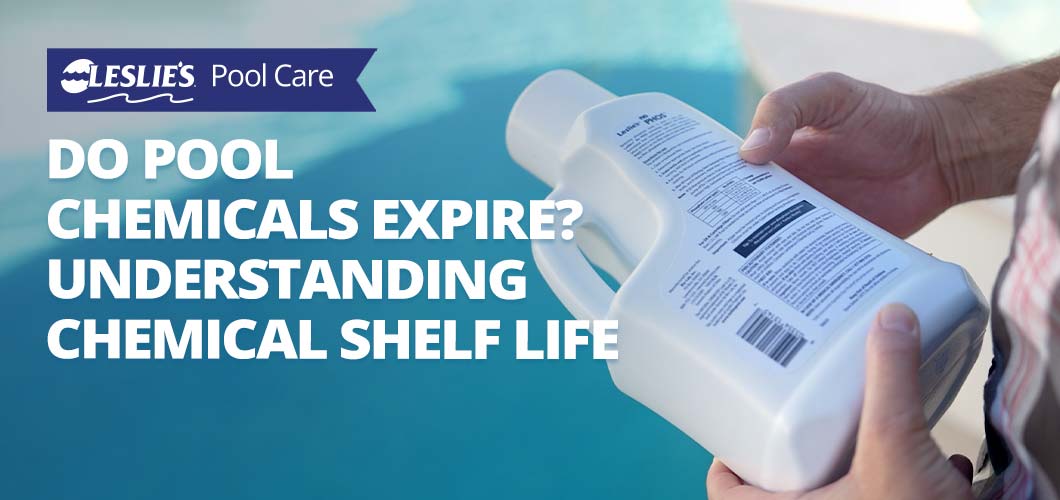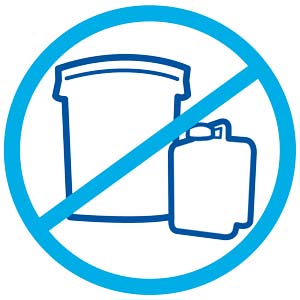
Do Pool Chemicals Expire? Understanding Chemical Shelf Life

You buy pool chemicals, and then you store them. If you own a pool, it’s likely you’ve done this hundreds of times before. But did you know that pool chemicals can expire? As a pool owner, it's crucial to know how long your pool chemicals last — and when it's time to replace them. By understanding the expiration guidelines and best practices for storage, you'll ensure your chemicals remain effective for as long as possible. This not only saves you money by avoiding unnecessary replacements and excessive water treatments, but it helps you maintain a clean, safe, and beautiful pool all year round.
Do Pool Chemicals Have an Expiration Date?
Unlike the "use by" dates found on most food labels, pool chemicals usually aren’t packaged with an explicit expiration date. This is because storage conditions play a key role in how quickly the chemicals will go bad. So, how long do pool chemicals last? In most cases, if you store your chemicals according to product label instructions, you can expect your products to last about a year from the date of purchase. Dry, granular chlorine can last a bit longer — but again, only if it's stored correctly. On the other hand, liquid chlorine has a very short shelf life of only a few weeks.
BONUS TIP: How you store your pool chemicals plays a key role in how long they'll last in storage. In general, the best way to store chemicals is to keep them in a clean, dry, well-ventilated area away from direct sunlight and extreme temperatures. For more information on the correct way to store pool chemicals, check out the storage article in our Resource Center.
How Do I Know if My Pool Chemicals Have Expired?
As pool chemicals age, their composition changes and they become less effective. Dry chemicals absorb moisture. In addition, exposure of any chemicals to sunlight or extreme cold or hot temperatures can have a significant impact on efficacy. Failure to follow product label recommendations will accelerate the degradation of these chemicals. Improper storage and handling is the leading cause of a shortened pool chemical lifespan. Being aware of these factors and taking the necessary precautions will help you extend the shelf life of your pool chemicals and maintain a healthy swimming environment.

So, how do you know if your pool chemicals have expired?
1. Visual Changes
First, start with a visual inspection. Has the color or consistency changed? This is usually the first indicator that your pool chemicals have expired. For example, chlorine tablets may become discolored or crumbly, indicating a loss of potency. If you notice any unusual changes in the appearance of your pool chemicals, it's best to replace them. Pool chemicals that don’t look normal should NOT be added to the pool! Contact your local waste management facility to ask about proper disposal methods for your old chemicals. Then, go get new products for your pool.
2. Purchase Date
Next, when did you purchase the bucket, bottle, or bag of product? If you don’t intend to refresh your stock at the beginning of each pool season, make a habit of writing the purchase date on the packaging. That way, you’ll know it’s time to replace your chemicals 12 months from the purchase date (or less). Again, exposure to moisture, humidity, and temperatures exceeding product label recommendations can shorten this timeframe dramatically. If you store your chemicals improperly, they may start to deteriorate after a couple of months.
3. Diminished Performance
Finally, if you’re adding the right chemical dosage to your pool, and it doesn’t have the effect you were expecting, this is often a good indicator that your chemicals are no longer good. There are a few caveats. For example, pools with high chlorine demand may use up chlorine almost as quickly as you can add it to the pool. Also, imbalanced Total Alkalinity levels may make it tough to get pH levels to stay within the proper range. It’s important to rule these issues out first before throwing out your chemical supply.
BONUS TIP: To rule out any underlying water quality issues, the best bet is to bring a sample of your pool water to your local Leslie’s for a free in-store AccuBlue® water test. This test precisely measures 10 different aspects of water chemistry to give you the most accurate results available. You’ll also get a customized, step-by-step water treatment plan based on your test results.
Why is it Important to Get Rid of Expired Pool Chemicals?
The problem with using old, expired chemicals is that you’ll often get inefficient, miscalculated water treatments. You might end up needing to test and treat the water more often than normal, because you won’t be able to accurately dose your pool when adding chemicals. Not only will this cause you to add more product to the water to achieve the same treatment results, but you’ll likely end up with recurring water quality problems, as well. Things like damaging or corrosive water imbalances, cloudy water, algae blooms, stains, and scale buildup can quickly take over your pool. You may also have trouble maintaining a well-sanitized swimming environment, leading to digestive or respiratory illness, skin rashes, eye irritation, and other unpleasant symptoms.
The best bet is to only use fresh chemicals purchased in the current season. Most pool owners clean out their chemical storage cabinet at the end of every swimming season, and discard any remaining, unused chemicals. That way, they can start fresh in the spring with chemicals that will get the job done right the first time. By knowing the expiration dates of different pool chemicals, you can ensure maximum potency and effectiveness, ultimately saving you time, money, and endless pool care headaches.
How Should I Dispose of Old Pool Chemicals?

Always start by reading the product label instructions. Many pool chemicals, especially those regulated by the EPA, include specific instructions on proper disposal. The label often provides guidance on how to neutralize, dilute, or treat the chemicals beforehand. Some chemicals may require special handling or transport to a hazardous waste facility. It’s important to always adhere to recommended disposal methods to protect both yourself and the environment.
In most cases, the safest and easiest route is to simply contact your local waste management facility and ask about disposal options and guidelines in your area. Some municipalities offer special collection events or designated drop-off locations for household hazardous waste. Others may ask you to bring the chemicals to their facility for disposal. But whatever you do, NEVER pour pool chemicals down the drain or into the environment.
Summary
Understanding when and why pool chemicals expire is vital for maintaining a clean and safe swimming pool. By understanding the expiration dates of different pool chemicals, properly storing and handling them, and regularly checking their effectiveness, you can ensure optimal water treatment and enjoy a worry-free swimming experience. Remember to replace expired pool chemicals promptly to avoid the negative effects on water quality and pool equipment, and of course the added costs involved with extra water treatments. By following these best practices, you’ll keep your pool healthy and ready for endless hours of fun and relaxation. If you have any questions or need help finding the right chemicals for your pool, call or stop by your local Leslie’s.